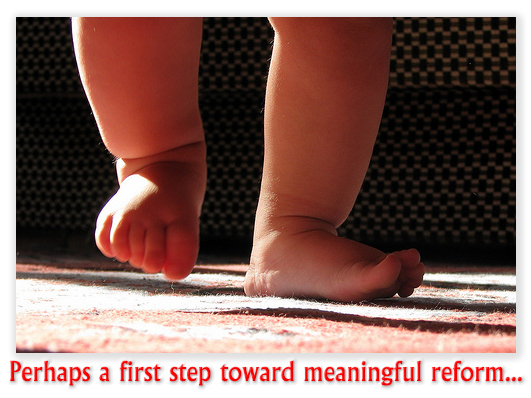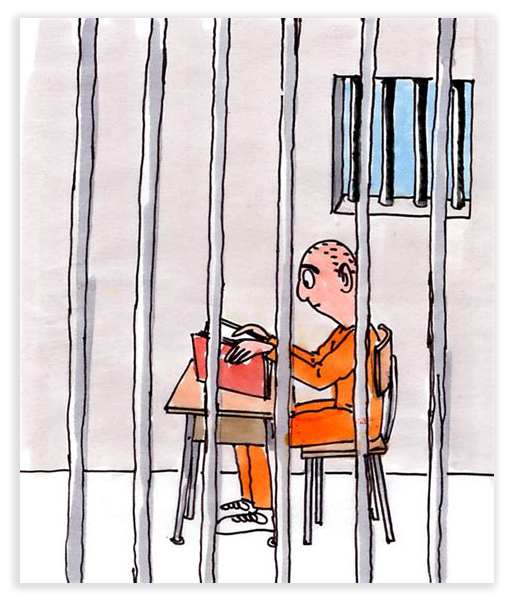We post news and comment on federal criminal justice issues, focused primarily on trial and post-conviction matters, legislative initiatives, and sentencing issues.
JUDICIARY COMMITTEE SENDS FIRST STEP ACT FOR FULL HOUSE VOTE
 In a surprise burst of bipartisan effort, the House Judiciary Committee this afternoon approved a new prison reform bill, H.R. 5682, being pushed by the White House.
In a surprise burst of bipartisan effort, the House Judiciary Committee this afternoon approved a new prison reform bill, H.R. 5682, being pushed by the White House.
The bill, called the “Formerly Incarcerated Reenter Society Transformed Safely Transitioning Every Person Act’’ or the ‘‘FIRST STEP Act,” offers more funding for prison programs in an attempt to reduce inmates’ likelihood to re-offend after they’ve been released.
The House Judiciary Committee approved the bill by a 25-5 vote, sending it to the House floor for a vote. The measure replaces the Prison Reform and Redemption Act, H.R. 3356, that had been set for markup two weeks ago. Reps. Doug Collins (R-Georgia) and Hakeem Jeffries (D-New York), co-sponsors of the PRRA, spent the last week negotiating after committee Democrats pushed back against a number of conservative provisions, which resulted in their introducing the new FIRST STEP Act.
 In the legislation now advancing to the House, lawmakers created more opportunities for prisoners to earn time credits by completing prison programs. Programs that may earn credit include working at UNICOR (Federal Prison Industries, Inc.) and adult education programs, as well as more traditional rehabilitation programs. Inmates participating the approved programs can earn 10 days of credit for every 30 days of classes, and while participating be given higher spending limits at the commissary, more phone and email time, and increased visits.
In the legislation now advancing to the House, lawmakers created more opportunities for prisoners to earn time credits by completing prison programs. Programs that may earn credit include working at UNICOR (Federal Prison Industries, Inc.) and adult education programs, as well as more traditional rehabilitation programs. Inmates participating the approved programs can earn 10 days of credit for every 30 days of classes, and while participating be given higher spending limits at the commissary, more phone and email time, and increased visits.
Priority for participation in recidivism reduction programs is to be given to medium-risk and high-risk prisoners, with access to productive activities given to minimum-risk and low-risk prisoners. Inmates may use credits earned in the programs to serve more time in halfway houses or on home confinement.
 The bill also clarifies current law, 18 USC 3624(b), to allow prisoners up to 54 days of credit for good behavior annually. The law was previously interpreted as only allowing prisoners to earn 47 days a year. A bipartisan amendment from was also approved to clarify that the legislative fix, which makes prisoners eligible for 54 days of good time instead of 47, applies to prisoners already serving sentences.
The bill also clarifies current law, 18 USC 3624(b), to allow prisoners up to 54 days of credit for good behavior annually. The law was previously interpreted as only allowing prisoners to earn 47 days a year. A bipartisan amendment from was also approved to clarify that the legislative fix, which makes prisoners eligible for 54 days of good time instead of 47, applies to prisoners already serving sentences.
Two additional provisions of interest to inmates and their families are, first, a directive that the BOP designate people to institutions within 500 driving miles of their families, where other factor permit it, and second, that the BOP “shall, to the extent practicable, place prisoners with lower risk levels and lower needs on home confinement for the maximum amount of time permitted under this paragraph,” which is 10% of the inmates’ sentence up to a maximum of six months. There is also a provision requiring increased use and transparency for compassionate release.
Sens. John Cornyn (R-Texas) and Sheldon Whitehouse (D-Rhode Island) have a companion bill in the Senate, S. 1994, The CORRECTIONS Act. Rep. Collins said he’s confident there’s enough Democratic support to get the bill through the House and the Senate.
 In a weird twist, some liberal groups have already called for the bill’s defeat on the grounds that it does not go far enough in that sentencing reform is not included and too many inmates are excluded. “The FIRST STEP Act, as introduced, would exclude too many in people in federal prisons from receiving time credits for participating in the rehabilitative programs authorized by the bill,” according to a statement issued by People for the American Way. “The long list of exclusions in the bill sweep in, for example, those convicted of certain immigration offenses and drug offenses. Because immigration and drug offenses account for 53.3% of the total federal prison population, many people could be excluded from utilizing the time credits they earned after completing programming.”
In a weird twist, some liberal groups have already called for the bill’s defeat on the grounds that it does not go far enough in that sentencing reform is not included and too many inmates are excluded. “The FIRST STEP Act, as introduced, would exclude too many in people in federal prisons from receiving time credits for participating in the rehabilitative programs authorized by the bill,” according to a statement issued by People for the American Way. “The long list of exclusions in the bill sweep in, for example, those convicted of certain immigration offenses and drug offenses. Because immigration and drug offenses account for 53.3% of the total federal prison population, many people could be excluded from utilizing the time credits they earned after completing programming.”
The group did observe that the “good-time” fix from 47 days to 54 days “could immediately impact 4,000 individuals if made retroactive, however this number has not been verified. According to a BOP calculation done over a decade ago, approximately 4,000 people could be eligible for release within a year, not on the first day of implementation. While the “good time fix” is a much needed, positive reform, which should become law, this provision alone is not enough to overcome our overwhelming concerns with the core of the bill as outlined above.”
The Hill, White House-backed prison reform bill advances in House (May 9, 2018)
H.R. 5682, Formerly Incarcerated Reenter Society Transformed Safely Transitioning Every Person Act (approved by House Judiciary Committee, May 9, 2018)
S. 1994: The CORRECTIONS Act
People for the American Way, PFAW and AAMIA to Congress: Criminal Justice Reform Requires More Than the “FIRST STEP Act”
(May 9, 2018)
– Thomas L. Root

